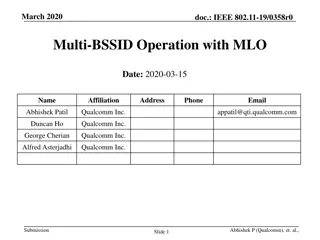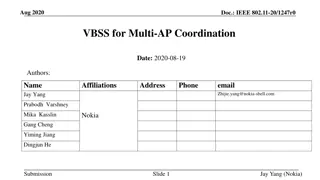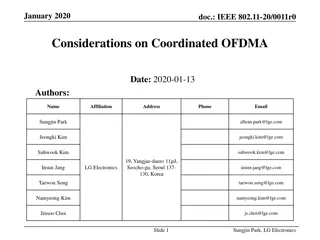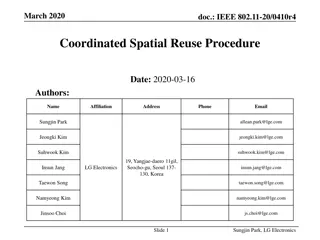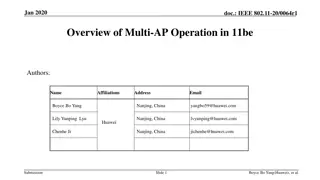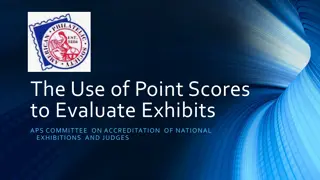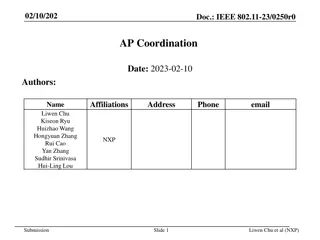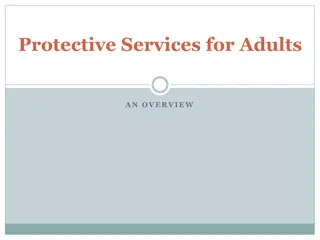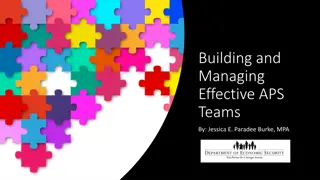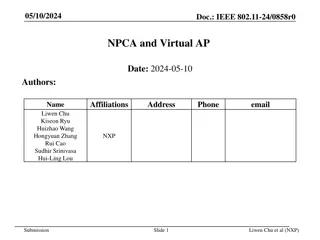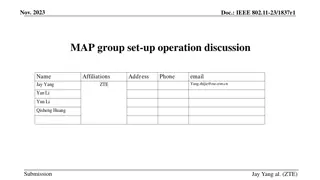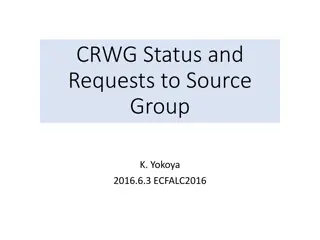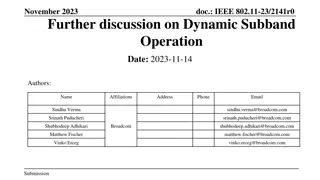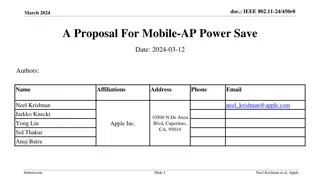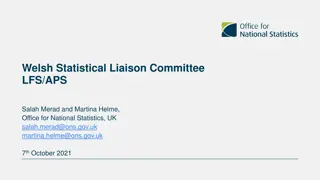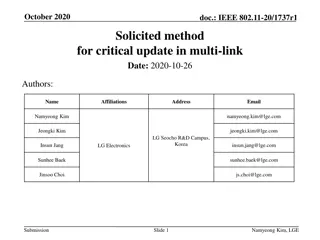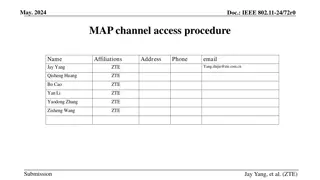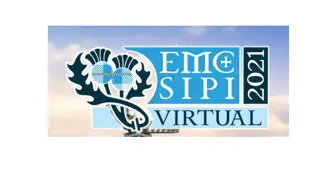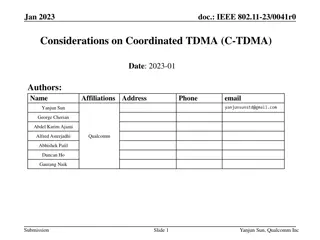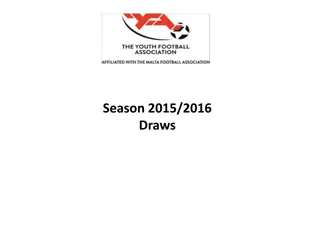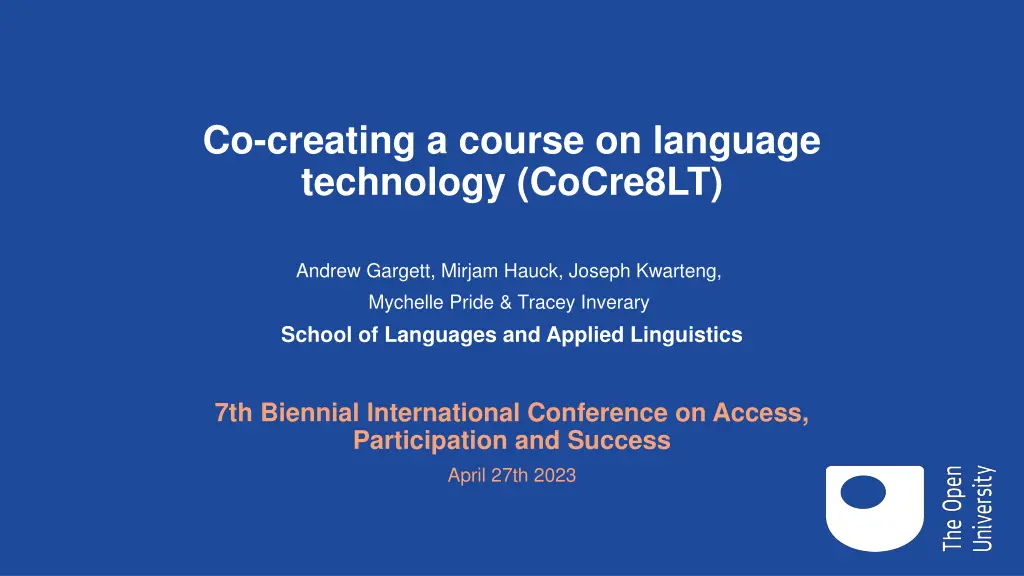
Empowering Language Learning and Technology at the Open Centre
Explore the CoCre8LT project, where a diverse team aims to co-create a new language technology course in partnership with students from widening participation backgrounds. The initiative focuses on designing a short course to better reflect student interests and preferences, particularly in Artificial Intelligence (AI). With a goal of enhancing student engagement and creating a replicable methodology for collaborative course development, this project bridges gaps in language education and intercultural communication at the Open Centre for Languages and Cultures.
Uploaded on | 1 Views
Download Presentation

Please find below an Image/Link to download the presentation.
The content on the website is provided AS IS for your information and personal use only. It may not be sold, licensed, or shared on other websites without obtaining consent from the author. If you encounter any issues during the download, it is possible that the publisher has removed the file from their server.
You are allowed to download the files provided on this website for personal or commercial use, subject to the condition that they are used lawfully. All files are the property of their respective owners.
The content on the website is provided AS IS for your information and personal use only. It may not be sold, licensed, or shared on other websites without obtaining consent from the author.
E N D
Presentation Transcript
Co-creating a course on language technology (CoCre8LT) Andrew Gargett, Mirjam Hauck, Joseph Kwarteng, Mychelle Pride & Tracey Inverary School of Languages and Applied Linguistics 7th Biennial International Conference on Access, Participation and Success April 27th 2023
Outline Introduction Background Approach Summary Artist Sougwen Chung with one of her collaborators From: https://sougwen.com/project/drawing- https://sougwen.com/project/drawing-operations-unit-generation-3 https://sougwen.com/project/drawing-operations-unit-generation-3 operations-unit-generation-3 2
Introduction Project details Team Motivations Goals Mirjam H., Co-I Methodology, evaluation of findings To involve students from Widening Participation backgrounds in designing a new short course within the OCLC Traditionally the short courses within the Centre have been designed by staff Students/Learners develop skills and experience in pedagogical practice An AI course that better reflects student interests & study preferences Andrew G., Co-I Developing theoretical background, methodology, leading workshops, evaluation Staff better understand student motivations & interests in studying AI To pilot a new way of working that involves partnering with students To respond to challenges in creating courses in Artificial Intelligence (details later) Joseph K., Research Assistant Students feel views and contributions are valued Mychelle P., APS guidance Students can see their interests, views & experiences reflected in the course content Natalie Moore, Academic support To engage students from widening participation backgrounds, i.e. APS student groups, in not only curriculum development, but also in AI-related areas of work Duration Longer term goals To be completed: Winter 2022 To devise a replicable & re-usable method for successfully co-creating courses with learners, where these course have potentially large amounts of complex technical content to deliver Deliverables Workshops & reports Conference publications Basis for designing a new short course in Language technology in the workplace for Open Centre in Languages & Cultures (OCLC) 3
WHAT IS THE OPEN CENTRE FOR LANGUAGES AND CULTURES? The Open Centre for Languages and Cultures is a one stop shop for engaging with languages, professional communication and intercultural dialogue for leisure, work, professional development and academic study across time zones and geographical distance. The Open Centre for Languages and Cultures aims to address the following challenges: Language and intercultural learning is vital to the economy and for an inclusive society both in the UK and internationally but a more flexible approach is needed Across the HE sector there has been a decline in student recruitment on language qualifications Individuals in the UK and internationally need opportunities to develop careers with appropriate cultural knowledge and attitudes and improved intercultural communication competencies for the workplace The Open Centre for Languages and Cultures offers flexible non-accredited short courses that can be studied anywhere in the world For those looking to turn non-accredited learning to accredited learning can so do through a specific OU module Making your learning count (300 hours of learning for 30 credits)
Background Setting the scene Acknowledgments: Uzma Peeran, Impact & Evaluation Manager (APS) Widening participation background Student groups identified in the OU s Access and Participation Strategy (& the APP) Co-creation [A] collaborative, reciprocal process through which all participants have the opportunity to contribute equally, although not necessarily in the same ways, to curricular or pedagogical conceptualization, decision-making, implementation, investigation, or analysis (Bovill & Felten, 2014, p6 7) Characterised by (Cook-Sather, 2020): Reciprocal relationship that breaks down traditional hierarchies Students and staff collaborating on a project Students being able to actively shape (including challenge) what teaching looks like Student and staff voices are viewed as equal
Background Challenges General challenges Challenges to Equality, Diversity & Inclusiveness Pedagogical challenges AI is an extremely fast-moving field Many 100s new research papers every week Applications extending into almost every domain of society How to support co-creation given the novelty and complexity of the material All the above, plus How to collaboratively capture insights Rather than top-down directions Breaking down traditional hierarchies Sharing power meaningfully with students The digital divide is increasing Historically low levels of representation in AI amongst women, minorities, LGBTQ+, neurodiverse communities, and others All major OECD nations have industrial strategies in place, which is driving commercial activity Wider social disparities in the AI domain exacerbate historical inequities How to boost student voices and contributions, in an academic domain with a reputation for being difficult Balancing support vs. autonomy Global shortages of skills How to enable learners to address historical inequities from their own point of view How to ensure learning opportunities for staff as well as students/learners 6
Background Co-design is increasing throughout AI (See: Unit 3 of AI matters (OCLC)) https://www.open.ac.uk/courses/short-courses/lg003 7
Approach Co-creation and design design thinking Exemplar approach to design: Think. Make. Break. Repeat. (Tomitsch & Wrigley) 1. Design thinking: Framing the problem: collecting data from and about real people, then beginning to work out how to translate this data into ideas and concepts. The importance of understanding users needs. 2. Design making: Conceptualisation Prototyping the Minimal Viable Product 3. Design breaking: Test-run the MVP Resetting expectations, including about what counts as a solution. 4. Repeat: Some or all of the previous steps Some agreed upon number of iterations Mapping design thinking to the co- creation course structure 1. Preparation ( think ): Pre-reading, reflections, collecting teaching & learning materials, etc 2. Co-creation sessions ( make ): Workshop meetings, present findings from 1. Conceptualisation Prototyping Delivering MVP by end of the session Assign tasks for filling out the MVP 3. Critical reflection on sessions ( break ): Homework to go over workshop assignments, with broad remit of finding gaps, flaws, etc in classes, materials, etc under design. Homework tasks feed into next round of 1. 4. Series of sessions ( repeat ): Go through 1 3 some pre-arranged number of times.
Approach A series of workshops Workshop overview 3 - 4 sessions, 1.5 hours each Students and staff members Fine-tuning workshops session-by-session Working with workshop participants to co-create a learner journey for target course Using techniques from Human-Centred Design Incorporating resources from OU s Learning Design Participant-led research Discovering topics of current interest From online sources (eg reddits) A robust, repeatable method for course co-creation An important outcome is delivery of an approach to developing courses for a diverse and inclusive audience
Co-Creation Experience Takeaways by Tracey Inverary Experiential Knowledge Knowledge gained from the practical experiences of learning design processes, pedagogies like active learning and authentic assessment Perspectives were shared from a basis of different lived experiences with AI technology, research to actively obtain different lived experiences for the creation of personas Psychological Safety Freedom of expression, perspectives, experiences and no question was considered "silly" or unnecessary Enjoyable moments Favourites were the moments of discovery Room for Improvement? Miro Board usage and support Time!

